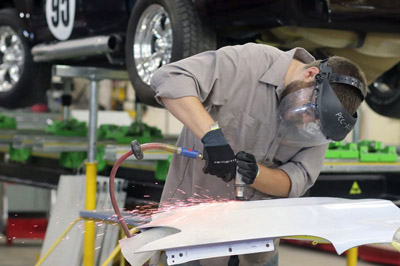Portland Community College's Auto Collision Repair Technology program is preparing the next generation of skilled workers to become qualified auto repair technicians.
According to the PCC, employment for auto collision repair technicians is expected to grow in Portland, OR, by 7.3% through 2027---a career in which technicians can expect an annual salary of $50,000 to $80,000 or higher.
Gail Krumenauer, state employment economist with the Oregon Employment Department, said the department projects 10-year growth for 800 different occupations every year, including auto body and related repairers as well as auto service technicians and mechanics.
According to employment department numbers, job openings in Oregon for auto body repairers is expected to increase 13.9% from 2020 to 2030, adding more than 200 jobs---nearly half of which are expected to be in the Portland metro area.
And for auto service technicians and mechanics, there is an additional projection for a nearly 8% increase from 2020-2030 throughout Oregon---expected to add 576 jobs to the state, and 321 to the Portland metro area.
"The project growth rates that are published look a little higher; part of that is because the projections start in 2020---which was a year when employment dropped significantly in Oregon," Krumenauer said. "We expected more growth in the first part of the decade to recover from the pandemic recession---and as of last month, we reached full jobs recovery from the pandemic recession."
PCC grad Kevan Banngertir earned his associate's degree this June from the auto repair program, and was immediately hired by Crash Champions Collision Repair Team, one of the largest repair companies in the nation.
This was not 33-year-old Banngertir's first career, he said.
"It just clicked and I thought, this is something I can retire with," Banngertir said. "I've grown the most in this program versus any other academic avenue I've tried to take."
PCC's auto repair program was established in 1970, and takes place at the Rock Creek Campus 17,000-square foot facility.
Erik Peterson is a PCC faculty member, industry veteran and a graduate of the program as well.
"(Banngertir) is one of the most proficient, determined and successful students I've ever had," he said. "His excitement for learning this craft fueled my enthusiasm and was encouraging in a symbiotic way."
After the shop closed for 15 months during the pandemic, Banngertir was one of eight students who returned from what was originally a 20-student cohort.
"I'm pretty proud to have been able to find a career that fit me, and I'm excited to take it to the next level," Banngertir said.










